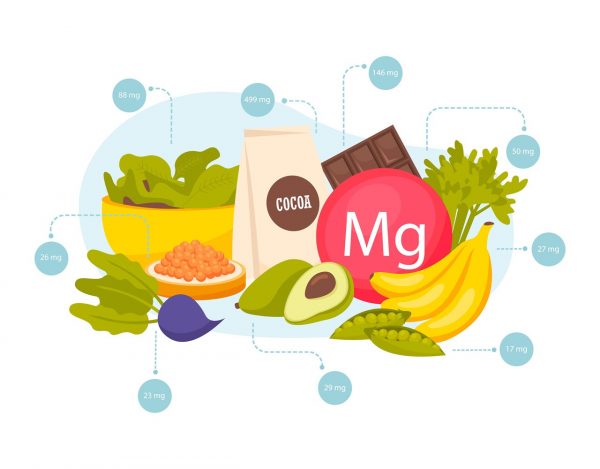Magnesium Glycinate: Your Key to Relaxation and Overall Health

©️ macrovector / Freepik
Magnesium is a mineral superstar, playing a crucial role in over 300 bodily functions. But did you know there are different forms of magnesium supplements, each with varying absorption rates and benefits? Enter magnesium glycinate, a gentle and bioavailable form that is gentle on your stomach and can significantly improve your health.
Magnesium Glycinate Health Benefits
The magic of magnesium glycinate goes far beyond promoting relaxation and sleep. This essential mineral plays a vital role in:

Bone Health: Magnesium is a building block for strong bones. It helps with the absorption of calcium, crucial for bone formation and density, and may even help prevent osteoporosis.
Blood Sugar Management: Adequate magnesium levels can improve insulin sensitivity, a hormone that helps regulate blood sugar levels. This is particularly beneficial for people with prediabetes or type 2 diabetes.
Muscle Function and Pain Relief: Magnesium is involved in muscle contraction and relaxation, and deficiency can contribute to muscle cramps, spasms, and pain. Supplementing with magnesium glycinate can help alleviate muscle tension and pain, improving overall mobility and function.
Heart Health: Magnesium contributes to maintaining a healthy heart rhythm and blood pressure. It helps relax blood vessels, which can improve blood flow and reduce the risk of heart disease.
The Stress and Magnesium Connection: Did you know chronic stress depletes magnesium levels in the body? This creates a vicious cycle, as magnesium deficiency can further exacerbate stress symptoms. When stressed, the body releases cortisol, which increases magnesium excretion through urine. This depletion can lead to fatigue, anxiety, and difficulty sleeping, all of which worsen stress. Supplementing with magnesium glycinate can help replenish these stores, promote stress resilience, and break this cycle.
Unveiling the Power of Magnesium for Sleep
Do you toss and turn all night, longing for a restful sleep? Magnesium glycinate can be your knight in shining armor. This gentle form acts as a natural relaxant, promoting the production of calming neurotransmitters like GABA (gamma-aminobutyric acid). GABA acts like a brake on the nervous system, quieting the mind and promoting feelings of calmness, making it easier to drift off to sleep and stay asleep throughout the night.

Magnesium for Anxiety Relief
Feeling overwhelmed and anxious? Don’t underestimate the power of magnesium. Studies suggest a strong link between magnesium deficiency and anxiety disorders. Magnesium regulates the stress hormone cortisol, which, when elevated due to chronic stress, can exacerbate anxiety symptoms. By calming the nervous system and regulating cortisol levels, magnesium glycinate can help you manage stress and anxiety more effectively.
How Much Magnesium Glycinate Do I Need?
There is no one-size-fits-all answer to this question. The recommended daily intake of magnesium varies depending on individual factors like age, gender, and overall health. It’s crucial to consult with your doctor to determine the appropriate dosage for you. Generally, the recommended daily intake of magnesium ranges from 250-400mg.
Unlocking Optimal Absorption: Not all magnesium supplements are created equal. Magnesium glycinate boasts high bioavailability, meaning your body can readily absorb it. This is because it’s bound to glycine, an amino acid that facilitates easy intestinal absorption. Additionally, consider taking magnesium with meals to further enhance absorption.
Fueling Your Body With Magnesium-Rich Foods
While supplementation is a great way to ensure adequate magnesium intake, incorporating magnesium-rich foods into your diet is also essential. Here is a treasure trove of magnesium-rich foods to add to your plate:

Leafy Green Vegetables: Leafy greens like spinach, kale, and Swiss chard are powerhouses of magnesium. Just one cup of cooked spinach provides about 15% of the recommended daily intake of magnesium.
Nuts and Seeds: Nuts (almonds, cashews, peanuts) and seeds (pumpkin seeds, chia seeds, flaxseeds) are excellent sources of magnesium and healthy fats.
Dark Chocolate: Craving something sweet? Indulge in dark chocolate (70% cacao or higher) in moderation. It offers a delightful dose of magnesium and antioxidants.
Legumes: Beans, lentils, and chickpeas are not only a great source of protein and fiber, but they’re also packed with magnesium.
By combining a high-quality magnesium glycinate supplement with a magnesium-rich diet, you can unlock a multitude of health benefits and experience a calmer, healthier you. Remember, it’s always best to consult your doctor before starting any new supplements, especially if you have any underlying health conditions.
Share with us the difference magnesium glycinate has made in you!
You may also like: Master Your Mind: 8 Tips for Improving Mental Focus
Disclaimer: The information provided on this website is for general informational purposes only and is not intended as a substitute for professional advice, diagnosis, or treatment. Always seek the advice of your physician or other qualified health provider with any questions you may have regarding a medical condition.


